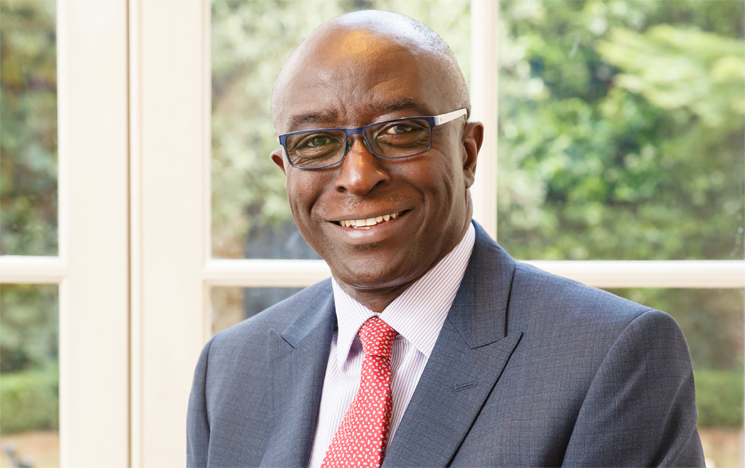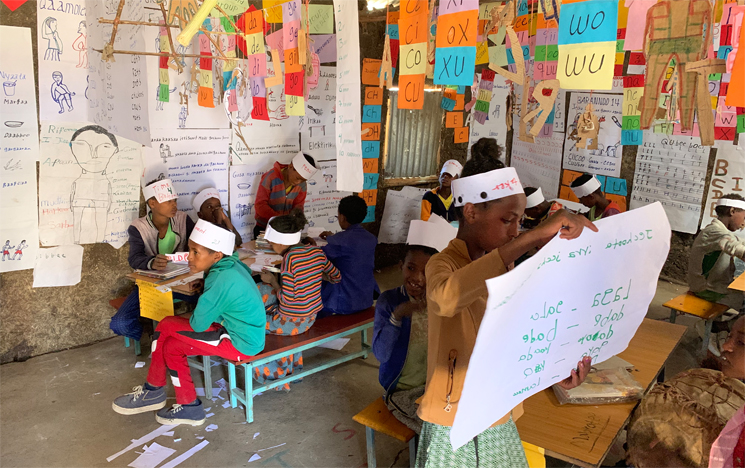How ‘speed schools’ brought African children back into the classroom
Kwame Akyeampong’s research into a new learning programme is helping to remove education inequalities in some of the world’s poorest countries.

For many children, education attainment is dependent on factors beyond their intelligence and ability. This is particularly evident in low-income countries, where poverty can diminish opportunities for learning.
Kwame Akyeampong, joined the University of Sussex’s Centre for International Education in 2004 and rose to become a Professor of International Education and Development. Akyeampong has looked in depth at how education inequalities arise and what can be done to address them.
He says: “In many low and low-middle income countries too many children fail to complete a full cycle of basic education due to various exclusions, some of which are ‘silent’ and therefore do not receive sufficient policy attention. These include over-age entry, poor attendance, low achievement, disability, under-nutrition, HIV/AIDS orphanhood, and the impact of migration.”
In 2005 he began a research project to identify the fundamental reasons why so many children were failing to stay in primary education in sub-Saharan Africa. A disparity between the style of teaching and pupils’ engagement emerged as the key factor.
This led to new research that examined the effectiveness of tailored learning programmes, which have subsequently been adopted by the Governments of Ghana and Ethiopia and have brought more than 450,000 out-of-school children back into the classroom.
Outdated colonial-style teaching
Akyeampong’s earlier research with Jo Westbrook and Emeritus Professor John Pryor from the Centre for International Education at Sussex, looked at the impact of primary teacher preparation in schools in Ghana, Kenya, Mali, Senegal, Tanzania and Uganda.
It revealed that many trained teachers lacked the capacity to teach basic literacy and numeracy skills. This quickly led to more vulnerable children – especially those from poor, rural and malnourished communities – dropping out of school.
His later research from 2018 also found that the most vulnerable children found it difficult to engage in an education system not taught in their local language in the early grades. It was especially problematic that the system was based on colonial principles of rote learning about a world unrelated to the children’s own experience and identity.
“Parents want their children to attend school and succeed,” says Akyeampong, “but multiple circumstances, including poor health, poverty, lack of connection with the education system, and an inability to see beyond their limited resources all become barriers.”
With this evidence, he turned his attention to researching an innovative ‘Speed School’ programme, set up by an Ethiopian team, for children who have dropped out of basic education in Africa. This involved introducing out-of-school children to an accelerated learning programme designed to bring them up to the same levels as those who had stayed in education.

Learning related to children’s experiences
The Speed School focuses on creative group learning in the children’s mother tongue, with curriculum content more aligned to their experience to help them become able and resilient learners.
Set up in Ethiopia in 2011, results from Akyeampong and Co-Investigator colleagues Jo Westbrook and John Pryor, together with a research team from the University of Hawassa in Ethiopia, were astounding. Not only did those who had left education manage to catch up with their peers during this period, they surpassed the literacy and numeracy skill of those who had not experienced the programme.
The style of teaching saw school dropouts progress from being unable to recognise letters of the alphabet at the start of the programme to reading passages fluently by the end of it.
“They had become effective learners – able to build on their successes to achieve impressive learning outcomes in government public schools,” says Akyeampong.
The programme also gave students aspirations to study beyond the basic level of education. Follow-up data showed they were much less likely to drop out of lower secondary education.
Its success led to it being rolled out to more than 250 classrooms across several regions of Ethiopia and has resulted in more than 200,00 out-of-school children re-engaging with education.
Raising aspirations
The research also informed the design of a study in Ghana for an accelerated learning programme for school dropouts. The two-year study found that it was possible to raise their achievement levels to be the equivalent of those who had completed four years of mainstream education.
“These results proved that we had successfully identified how to unlock the potential of out-of-school children, enabling them to turn around their education to help them succeed,” says Akyeampong.
The impressive results from Akyeampong and his Co-Investigator colleague Sean Higgins from Sussex, and a Ghanaian research team, has led the Governments of Ethiopia and Ghana to integrate the programmes into their education systems.
In Ghana, the Ministry of Education has committed to allocate one percent of its Basic Education Budget to the implementation of a Complementary Basic Education (CBE) programme across the country.
Akyeampong has continued to work on numerous international research and evaluation projects. In 2020, he was appointed a member of the new Global Education Evidence Advisory Panel (GEEAP) established by the World Bank and UK Foreign, Commonwealth and Development Office (FCDO). The Panel reviews and assesses evidence-based and cost-effective practices that can improve education outcomes to help policymakers in low-and middle-income countries make decisions.
He says: “There’s still a need to accelerate movement towards providing universal access to education worldwide.
“Major progress has indeed been made towards increasing access to education at all levels and increasing enrolment rates in schools. This is particularly true for girls. And basic literacy skills have improved tremendously.
“But bolder efforts are necessary to make even greater strides for achieving universal education goals”.
Professor Akyeampong has recently left Sussex to take up a Chair in International Education & Development at the Open University.
Contact us
Research development enquiries:
researchexternal@sussex.ac.uk
Research impact enquiries:
rqi@sussex.ac.uk
Research governance enquiries:
rgoffice@sussex.ac.uk
Doctoral study enquiries:
doctoralschool@sussex.ac.uk
Undergraduate research enquiries:
undergraduate-research@sussex.ac.uk
General press enquiries:
press@sussex.ac.uk